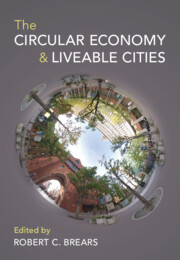Book contents
- The Circular Economy and Liveable Cities
- The Circular Economy and Liveable Cities
- Copyright page
- Contents
- Contributors
- Acknowledgements
- 1 An Overview of Circular Economy and Liveable Cities
- 2 Circular Urban Agriculture
- 3 Urban Water Demand Management
- 4 Vibrant Streets
- 5 Sustainable Built Environment in Circular Economy Liveable Cities
- 6 Dynamic Water Resource Management for Regenerative Cities
- 7 Renewable Energy and Energy Efficiency in Circular Economy Liveable Cities
- 8 Urban Nature-Based Solutions to Create Circular and Liveable Cities
- 9 Environmental Justice, Circular Economies, and Green Living
- 10 Circular Economy as a Pathway to City Resilience and Sustainability
- 11 Governing the Transition to Circular Economy and Liveable Cities
- 12 The Role of Education in Developing Liveable Cities with Functioning Circular Economies
- 13 Circular Business Models and Synergies in Circular Economy Liveable Cities
- 14 Best Practices and Ways Forward for Cities to Become Circular and Liveable
- Notes
- Bibliography
- Index
8 - Urban Nature-Based Solutions to Create Circular and Liveable Cities
Published online by Cambridge University Press: 05 September 2025
- The Circular Economy and Liveable Cities
- The Circular Economy and Liveable Cities
- Copyright page
- Contents
- Contributors
- Acknowledgements
- 1 An Overview of Circular Economy and Liveable Cities
- 2 Circular Urban Agriculture
- 3 Urban Water Demand Management
- 4 Vibrant Streets
- 5 Sustainable Built Environment in Circular Economy Liveable Cities
- 6 Dynamic Water Resource Management for Regenerative Cities
- 7 Renewable Energy and Energy Efficiency in Circular Economy Liveable Cities
- 8 Urban Nature-Based Solutions to Create Circular and Liveable Cities
- 9 Environmental Justice, Circular Economies, and Green Living
- 10 Circular Economy as a Pathway to City Resilience and Sustainability
- 11 Governing the Transition to Circular Economy and Liveable Cities
- 12 The Role of Education in Developing Liveable Cities with Functioning Circular Economies
- 13 Circular Business Models and Synergies in Circular Economy Liveable Cities
- 14 Best Practices and Ways Forward for Cities to Become Circular and Liveable
- Notes
- Bibliography
- Index
Summary
This chapter explores urban nature-based solutions (NBSs) as an essential strategy for creating circular and liveable cities. NBSs leverage natural processes and ecosystems to address various urban challenges, including climate change adaptation, biodiversity loss, water management, and urban resilience. The chapter highlights how NBS can transform cities into more sustainable, resource-efficient environments while offering social, economic, and environmental benefits. Key urban NBSs discussed include green roofs, green walls, community gardens, permeable pavements, bioswales, urban forests, and constructed wetlands. These solutions not only contribute to mitigating the effects of urbanisation but also improve air and water quality, reduce the urban heat island effect, and enhance biodiversity. By integrating nature into urban planning, cities can become more resilient to extreme weather events and better equipped to manage natural resources sustainably. The chapter further emphasises the importance of policy frameworks and financial incentives to encourage the widespread adoption of NBS. Case studies from global cities illustrate the successful implementation of NBS and their positive impact on urban liveability. Ultimately, NBSs are a powerful tool in the circular economy framework, fostering healthier, greener, and more liveable cities that support both people and the planet.
Information
- Type
- Chapter
- Information
- The Circular Economy and Liveable Cities , pp. 112 - 134Publisher: Cambridge University PressPrint publication year: 2025
Accessibility standard: Inaccessible, or known limited accessibility
Why this information is here
This section outlines the accessibility features of this content - including support for screen readers, full keyboard navigation and high-contrast display options. This may not be relevant for you.Accessibility Information
Content Navigation
Allows you to navigate directly to chapters, sections, or non‐text items through a linked table of contents, reducing the need for extensive scrolling.
Provides an interactive index, letting you go straight to where a term or subject appears in the text without manual searching.
Reading Order & Textual Equivalents
You will encounter all content (including footnotes, captions, etc.) in a clear, sequential flow, making it easier to follow with assistive tools like screen readers.
Structural and Technical Features
You gain clarity from ARIA (Accessible Rich Internet Applications) roles and attributes, as they help assistive technologies interpret how each part of the content functions.
